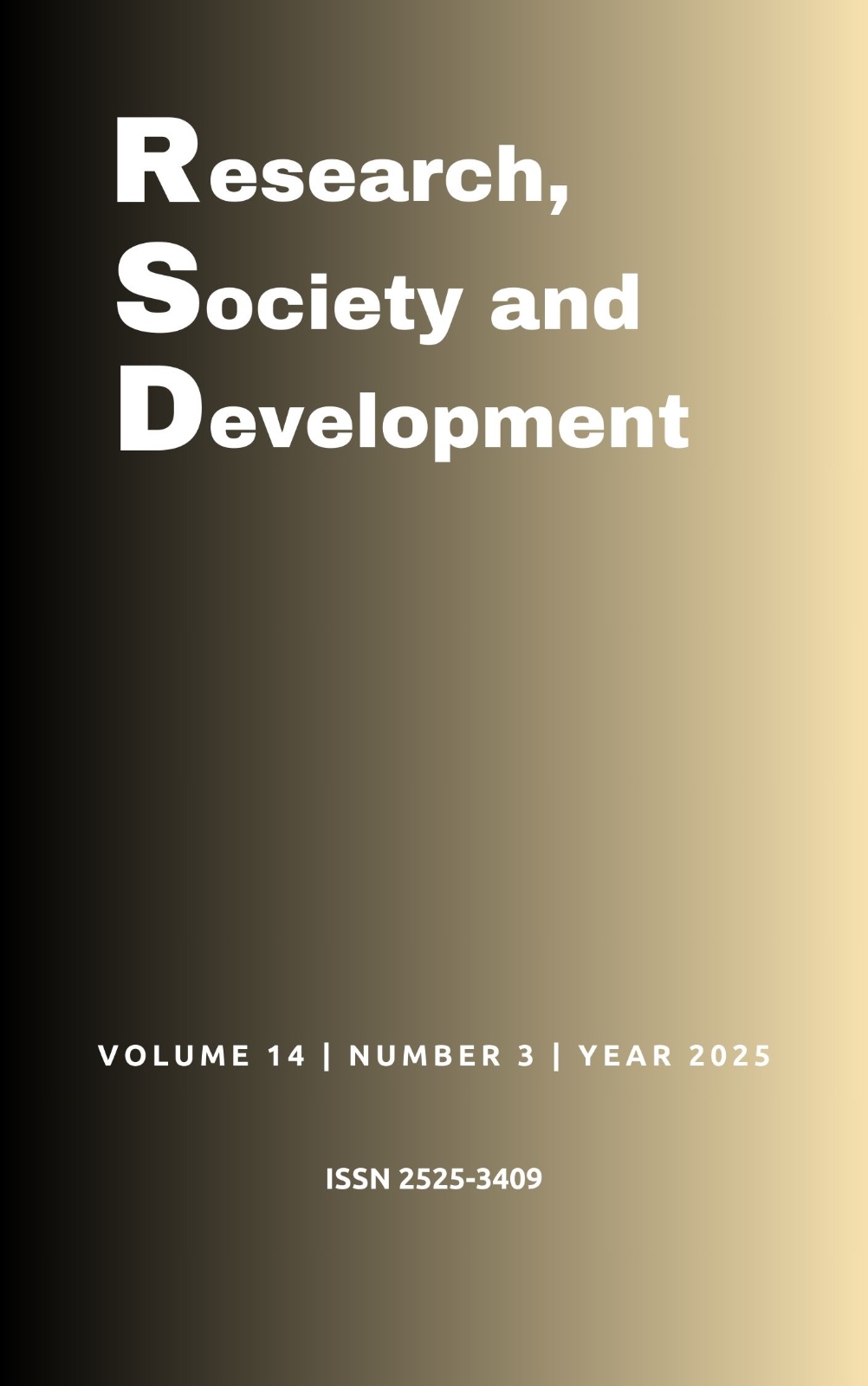Memory updating and hypnotherapy in the modulation of lactose intolerance: A multiple case report
DOI:
https://doi.org/10.33448/rsd-v14i3.48496Keywords:
Lactose intolerance, Hypnosis, Memory Consolidation, Psychosomatic Medicine, Neurosciences, Psychotherapy.Abstract
Lactose intolerance affects millions of people worldwide, significantly impacting quality of life due to undesirable gastrointestinal symptoms. Conventional treatments, such as dietary restriction and enzyme supplementation, fail to address potential emotional and psychological factors influencing the condition’s manifestation. This study aims to investigate the application of memory regression and updating using the RB7 method in treating lactose intolerance, analyzing whether psychological intervention can modulate patients' physiological responses. A total of 42 participants with a confirmed diagnosis were selected, of whom 36 completed the protocol. The intervention consisted of four individual hypnotherapy sessions focused on identifying and reinterpreting memories associated with adverse responses to lactose consumption. Symptom assessments were conducted before and after the intervention, as well as at a six-month follow-up. Results demonstrated a significant reduction in symptom frequency and intensity, with sustained therapeutic effects over time. These findings suggest that memory updating may play a crucial role in the physiological response to food intolerance, offering new insights for integrative therapeutic approaches. Further research is needed to elucidate the underlying mechanisms and explore its applicability to other gastrointestinal and psychosomatic conditions.
References
Black, C. J., Yuan, Y., Selinger, C. P., et al. (2020). Efficacy of psychological therapies for irritable bowel syndrome: Systematic review and network meta-analysis. Gut, 69(8), 1441-1451. https://doi.org/10.1136/gutjnl-2019-319375
Cohen, J. (1988). Statistical power analysis for the behavioral sciences. Academic Press.
Danese, A., & McEwen, B. S. (2012). Adverse childhood experiences, allostasis, allostatic load, and age-related disease. Physiological Reviews, 93(1), 134-157. https://doi.org/10.1152/physrev.00036.2011
Field, A. (2017). Discovering statistics using IBM SPSS Statistics (5ª ed.). Editora Sage.
He, T., Priebe, M. G., Harmsen, H. J., Stellaard, F., Sun, X., & Welling, G. W. (2020). Colonic metabolism of lactose in lactose intolerant subjects. American Journal of Clinical Nutrition, 71(5), 1433-1443.
Hedge, C., Powell, G., & Sumner, P. (2018). The reliability paradox: Why robust cognitive tasks do not produce reliable individual differences. Behavioral Research Methods, 50, 1166–1186. https://doi.org/10.3758/s13428-017-0935-1
Lee, J. L. C., Nader, K., & Schiller, D. (2017). An update on memory reconsolidation updating. Trends in Cognitive Sciences, 21(7), 531-545. https://doi.org/10.1016/j.tics.2017.04.006
Levine, J. A., Eberhardt, N. L., & Jensen, M. D. (1999). Role of nonexercise activity thermogenesis in resistance to fat gain in humans. Science, 283(5399), 212–214. https://doi.org/10.1126/science.283.5399.212
Lomer, M. C., Parkes, G. C., & Sanderson, J. D. (2008). Review article: Lactose intolerance in clinical practice–myths and realities. Alimentary Pharmacology & Therapeutics, 27(2), 93-103.
Mircioiu, C., & Atkinson, J. (2017). A comparison of parametric and non-parametric methods applied to a Likert scale. Pharmacy, 5(2), 26. https://doi.org/10.3390/pharmacy5020026
Misselwitz, B., Pohl, D., Frühauf, H., Fried, M., Vavricka, S. R., & Fox, M. (2019). Lactose malabsorption and intolerance: Pathogenesis, diagnosis, and clinical management. Gut, 68(11), 2080-2091.
Moore, D. S., McCabe, G. P., & Craig, B. A. (2009). Introduction to the practice of statistics (6ª ed.). Editora Freeman.
Nash, M. R., & Barnier, A. J. (2012). The Oxford handbook of hypnosis: Theory, research, and practice. Oxford University Press.
Palsson, O. S., & Whitehead, W. E. (2002). The growing case for hypnosis as adjunctive therapy for functional gastrointestinal disorders. Gastroenterology, 123(6), 2132-2135. https://doi.org/10.1053/gast.2002.37044
Pereira, A. S. et al. (2018). Metodologia da pesquisa científica [E-book gratuito]. Editora UAB/NTE/UFSM.
Schäfert, R., Kloiber, O., & Enck, P. (2014). The role of hypnosis in the treatment of irritable bowel syndrome and related disorders. Frontiers in Psychology, 5, 1076. https://doi.org/10.3389/fpsyg.2014.01076
Schwabe, L., Nader, K., & Pruessner, J. C. (2014). Reconsolidation of human memory: Brain mechanisms and clinical relevance. Biological Psychiatry. https://doi.org/10.1016/j.biopsych.2014.03.008
Shaukat, A., Levitt, M. D., Taylor, B. C., MacDonald, R., Shamliyan, T. A., Kane, R. L., & Wilt, T. J. (2010). Systematic review: Effective management strategies for lactose intolerance. Annals of Internal Medicine, 152(12), 797-803.
Shitsuka, R. et al. (2014). Matemática fundamental para tecnologia (2ª ed.). Editora Erica.
Slopen, N., Kubzansky, L. D., McLaughlin, K. A., & Koenen, K. C. (2013). Childhood adversity and inflammatory processes in youth: A prospective study. Psychoneuroendocrinology, 38(2), 188-200. https://doi.org/10.1016/j.psyneuen.2012.05.013
Speer, M. E., Ibrahim, S., Schiller, D., & Delgado, M. R. (2021). Finding positive meaning in memories of negative events adaptively updates memory. Nature Communications, 12, 6601. https://doi.org/10.1038/s41467-021-26906-4
Varjú, P., Farkas, N., Hegyi, P., Garami, A., Szabó, I., Illés, A., & Czimmer, J. (2019). Is the association between lactose intolerance and depression real? A systematic review and meta-analysis. Clinical Nutrition, 38(4), 1931-1942.
Vieira, S. (2021). Introdução à bioestatística. Editora GEN/Guanabara Koogan.
Whitehead, W. E. (2006). Hypnosis for irritable bowel syndrome: The empirical evidence of therapeutic effects. Gastroenterology, 131(3), 611-617. https://doi.org/10.1053/j.gastro.2006.06.006
Downloads
Published
Issue
Section
License
Copyright (c) 2025 Rafael Martin Barreiros; Francynne Gonçalves França; Aline de Paula Assis; Renata Cristina Bianchi; Jeferson Ferreira Brito; Sara Paola Dalponte Taques; Paulo Rogério Vieira; Caroline Rodrigues Perez; Cristina da Silva Sousa; Ingrid Rocha de Vasconcelos

This work is licensed under a Creative Commons Attribution 4.0 International License.
Authors who publish with this journal agree to the following terms:
1) Authors retain copyright and grant the journal right of first publication with the work simultaneously licensed under a Creative Commons Attribution License that allows others to share the work with an acknowledgement of the work's authorship and initial publication in this journal.
2) Authors are able to enter into separate, additional contractual arrangements for the non-exclusive distribution of the journal's published version of the work (e.g., post it to an institutional repository or publish it in a book), with an acknowledgement of its initial publication in this journal.
3) Authors are permitted and encouraged to post their work online (e.g., in institutional repositories or on their website) prior to and during the submission process, as it can lead to productive exchanges, as well as earlier and greater citation of published work.


